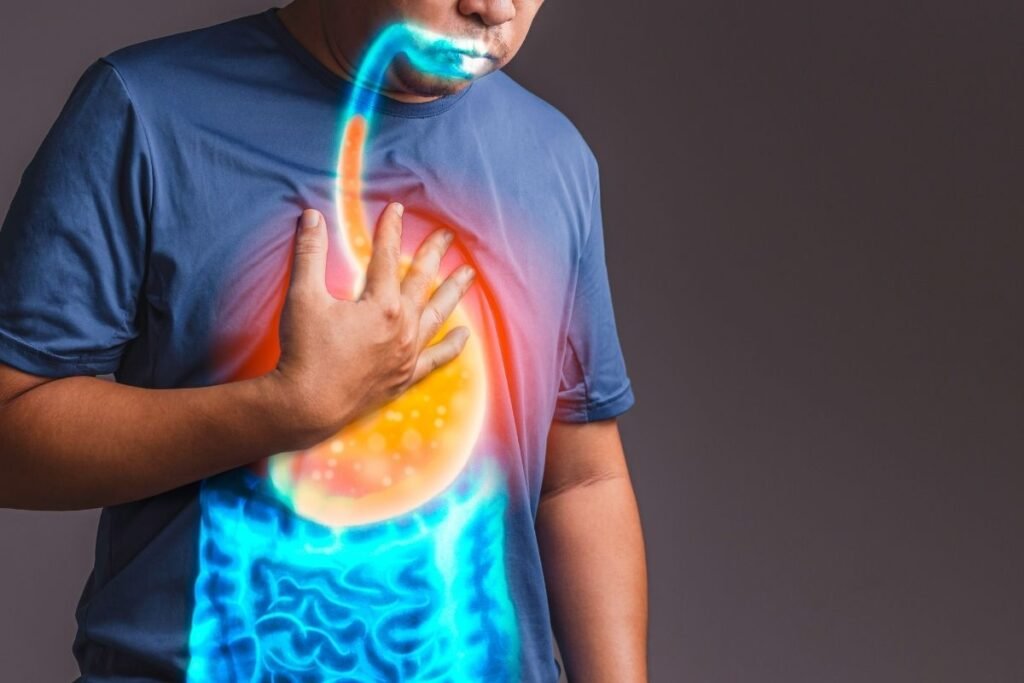According to a study published in the National Library of Medicine, around 50% of adults experience reflux symptoms at some point. And 18.1–27.8% of people in North America experience GERD.
Don’t you hate the burning feeling that creeps up your chest when you eat something tasty? Constant acid reflux can lead to Gastroesophageal Reflux Disease or GERD. That is why it is important to regulate your consumption of various foods to avoid GERD. But what exactly do we mean by acid reflux and GERD?
What is Acid Reflux?
When the acid in your stomach travels upwards and into your throat, it is known as acid reflux. It mostly occurs when the muscle that allows food into your stomach does not close properly. Stomach acid can irritate your tissues and cause inflammation. It can lead to heartburn, indigestion, or burning pain in the stomach and chest.
An episode of acid reflux is uncomfortable, but can be managed. When you get acid reflux constantly, it is known as GERD.
What is GERD?
Normal acid reflux is caused by temporary conditions. But GERD is a chronic condition that stems from acid reflux. Acid reflux is considered chronic when you experience it at least twice a week for several weeks. GERD is a persistent and constant problem. If you are experiencing the symptoms of GERD, it means that your body is unable to keep acid out of your esophagus. How do you know if you have GERD?
The symptoms of GERD include:
- A sour taste in the mouth. This is also known as backwash.
- A burning sensation, especially in the stomach
- Sore throat
- Nausea
- Coughing or shortness of breath.
- Non-burning pain in the chest
When should you see a doctor?
- If symptoms continue for more than two weeks
- If heartburn persists even after taking over-the-counter medication
- Heartburn interferes with your daily life
- Pain and difficulty swallowing
- Nausea and vomiting along with heartburn
Chronic acid reflux can significantly reduce your quality of life. In some cases, it can seriously damage your internal tissues. Hence, it is necessary to stay away from certain foods to avoid GERD.
Foods To Avoid if You Experience GERD
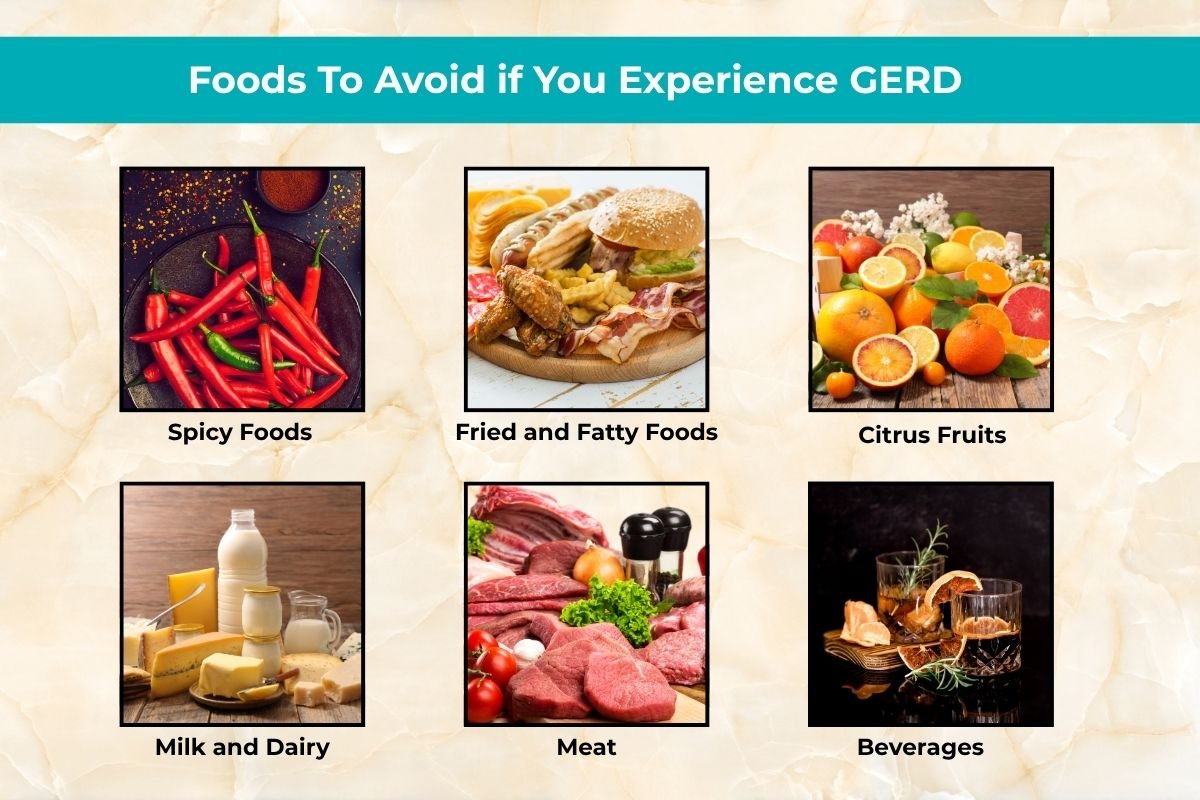
1. Spicy Foods
Spicy foods can cause burning in the stomach. It can further lead to abdominal pain. This can worsen if you have GERD. Spicy foods usually contain capsaicin, a compound that can irritate the stomach lining. It can also irritate certain parts of the esophagus. It is best to avoid chillies or spicy foods when you experience acid reflux. The most common foods to avoid GERD are:
- Hot peppers
- Spicy Curries
- Chilli Powder
- Cayenne Pepper
2. Fried and Fatty Foods
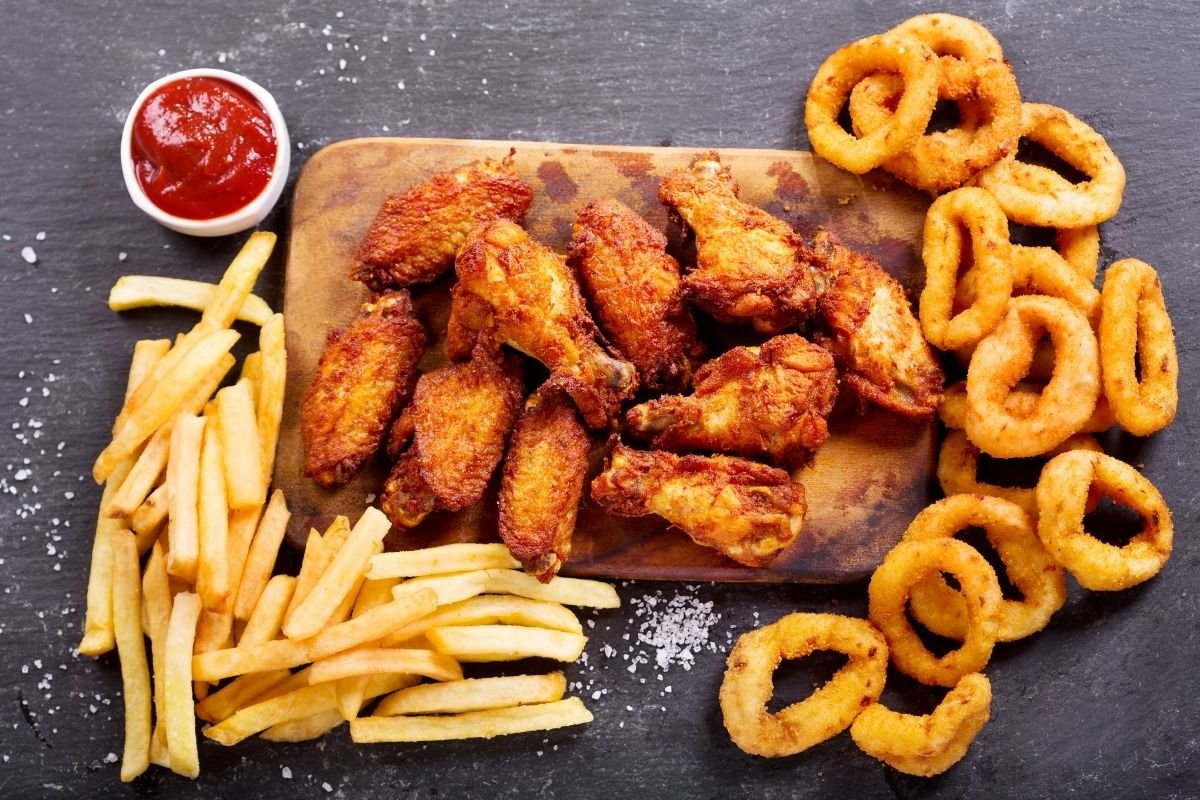
According to the National Institute of Diabetes and Digestive Kidney Diseases, fatty foods can be a trigger for GERD. They can slow down the stomach. This allows acid to move upwards and can increase the chances of acid reflux. Some fatty and fried foods to avoid GERD:
- Potato Chips
- French Fries
- Onion Rings
- Ice Cream
- Cheese
- Salad Dressings
3. Citrus Fruits
Citrus fruits are likely to trigger acid reflux. The citric acid present in these fruits can relax the esophagus. This can cause acid to rise up and worsen the symptoms of GERD. Some citrus fruits that you need to avoid are:
- Oranges
- Limes
- Lemons
- Pineapples
- Grapefruit
- Tomatoes
4. Milk and Dairy
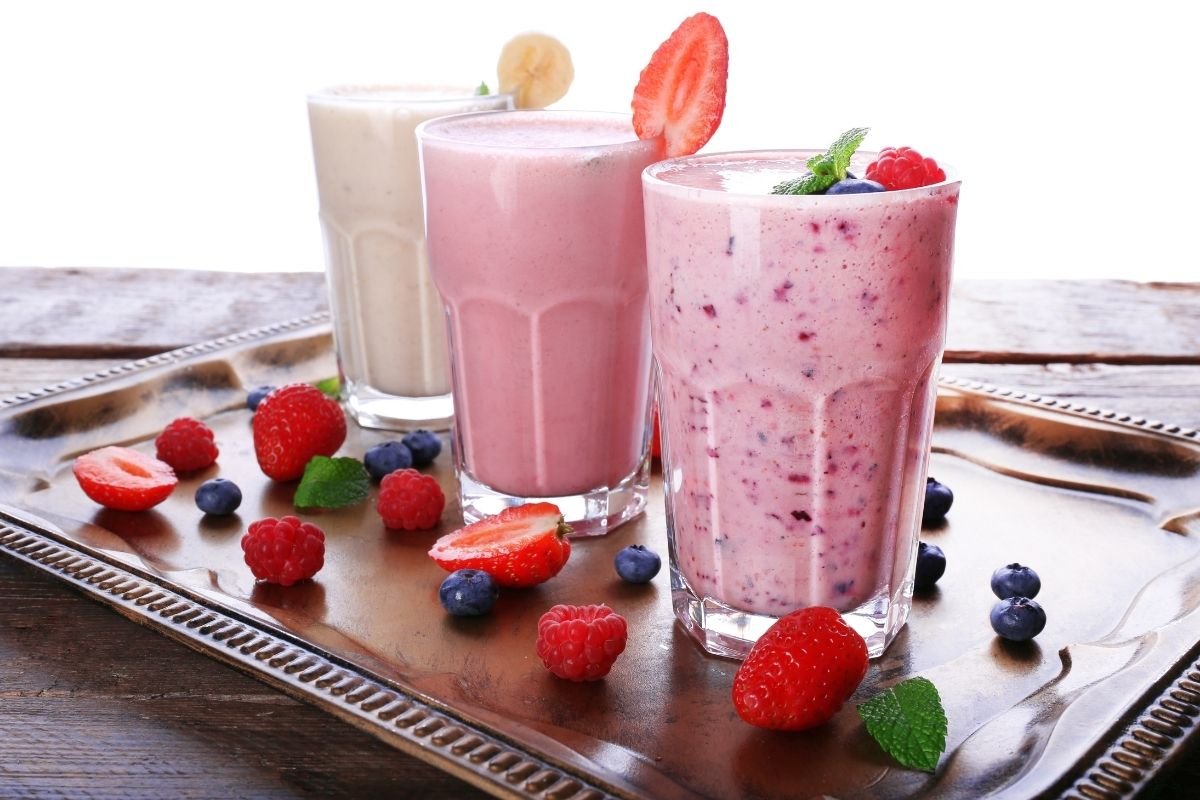
A study published in The National Library of Medicine, concluded that children with Cow Milk Allergy (CMA) often experienced symptoms of GERD. On the other hand, there has also been evidence that milk lowers nonerosive reflux disease. Regardless, consuming dairy products can cause bloating and discomfort. If you have a severe case of acid reflux, it might be best to distance yourself from dairy. Dairy products that you need to avoid are:
- Whole milk
- 2% milk,
- Yogurt
- Milkshakes
5. Meat
A study published in the European Journal of Investigation in Health, Psychology and Education A diet including animal products is significantly associated with a higher prevalence of GERD-related symptoms. This is because some meats can be high in saturated fats, they can cause GERD symptoms to flare up. Some meats foods To avoid GERD
- Red meat
- Lamb
- Sausages
- Bacon
6. Beverages
Drinking some beverages can cause GERD to worsen. According to doctors from The American Medical Association, “smoking and excessive alcohol use can also contribute to reflux”. But alcohol is not the only cause. The drinks which can cause GERD are:
- Carbonated Drinks
- Cafffeine
- Alcohol
- Soda
- Orange Juice
Reading the above list might have left you feeling like you have no options. Do you have to limit yourself this much? Fear not! There are a lot of foods that can nullify the symptoms of GERD.
Foods To Eat if You Experience GERD
1. Vegetables
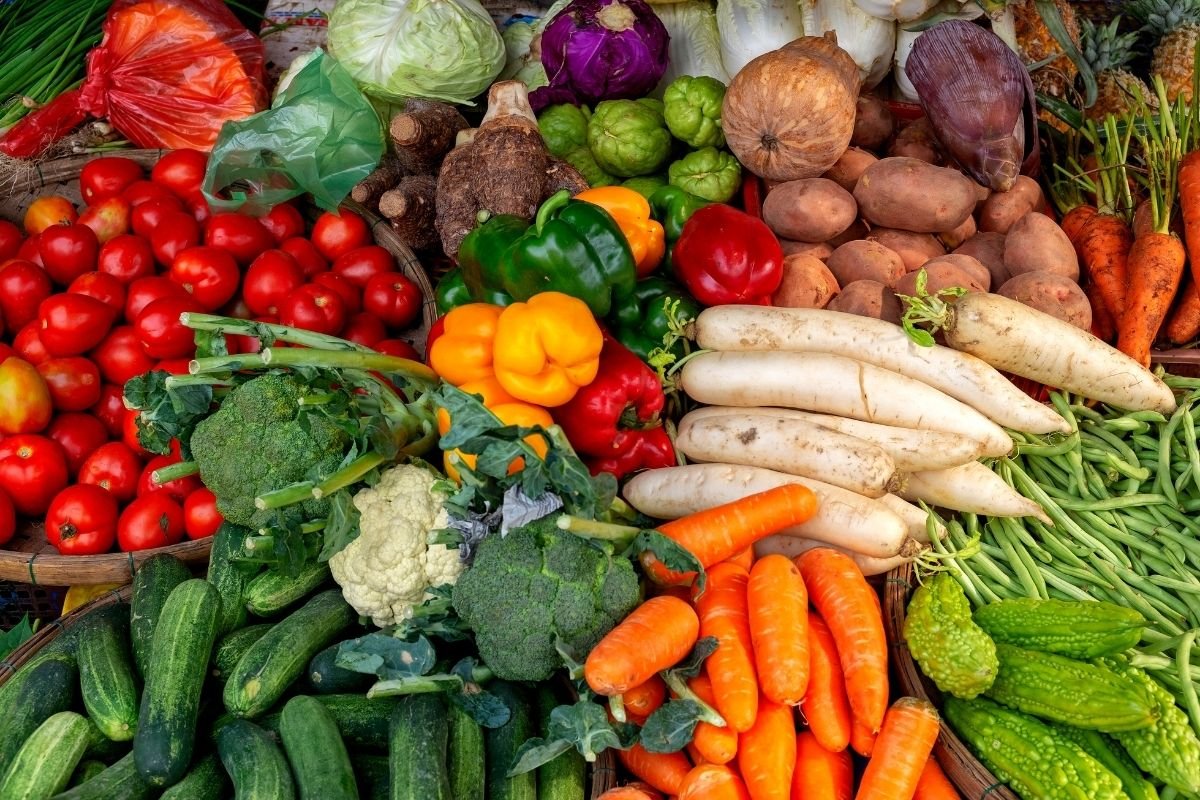
As opposed to some foods that are high in fats and sugar, vegetables are relatively low in sugar. Some veggies that can help relieve the symptoms of GERD are:
- Cauliflower
- Asparagus
- Green Beans
- Potatoes
- Cucumber
2. Healthy Fats
You might be confused to see fats listed as both good and bad for GERD. Fats are important for the body to function, but you must pick ones that are rich in the right fats or “healthy fats”. They are usually found in different types of oils. Some oils are rich in “healthy fats” might include:
- Olive
- Sesame Oil
- Avocados
- Sunflower Oil
3. Ginger
One thing that ginger is good at is helping digestion. It stops food from putting itself in reverse gear. Ginger is often used as a natural remedy for indigestion and nausea. Though be careful, too much ginger has a chance of causing heartburn.
4. Non-Citrus Fruits
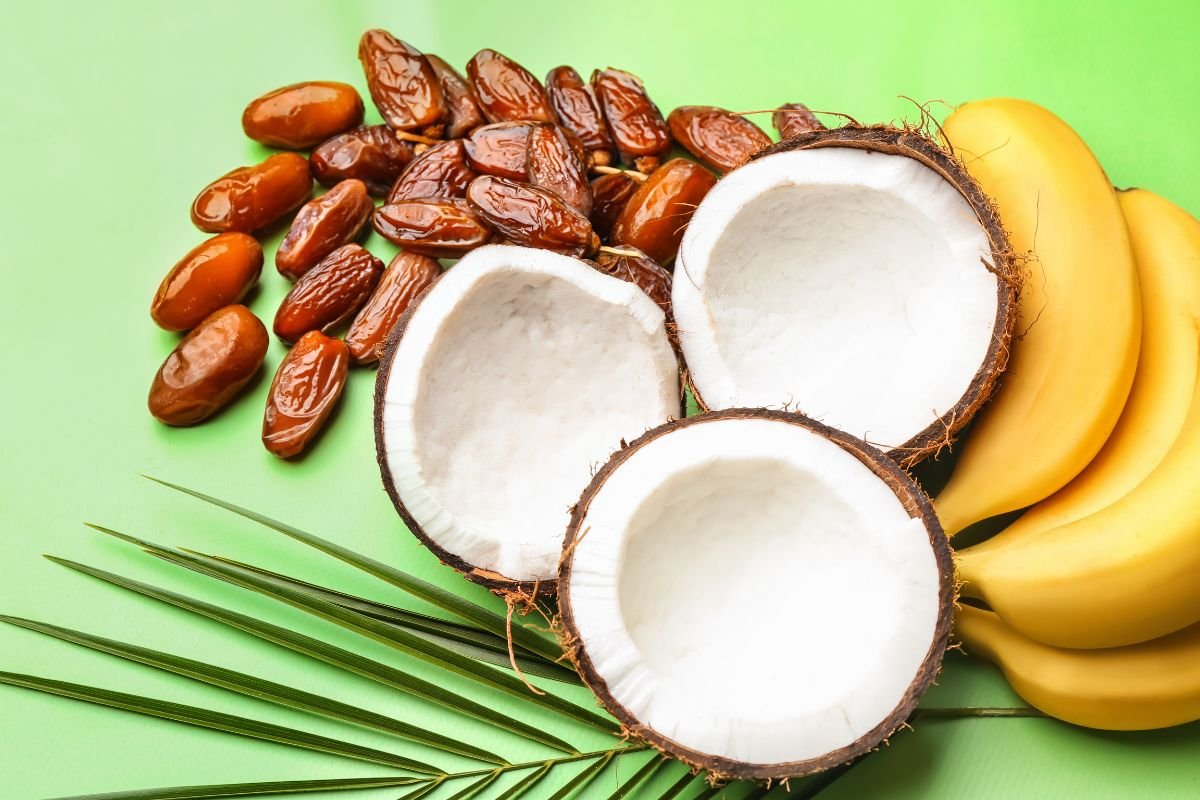
Non-acidic fruits are less likely to trigger acid reflux symptoms. They are also often rich in fibre, so they can make you feel full. Some non-citrus fruits that are best for helping GERD symptoms are:
- Banana
- Coconut
- Melons
- Figs
- Dates
- Berries
Conclusion:
Chronic acid reflux can be quite draining. It can distract you from your day-to-day activities and can limit your enjoyment of having certain foods. By understanding the foods to avoid GERD, you can progress towards managing its symptoms. The key to managing GERD is to have food in moderation.
Also Read :- The Ultimate Guide to Managing GERD Diet

